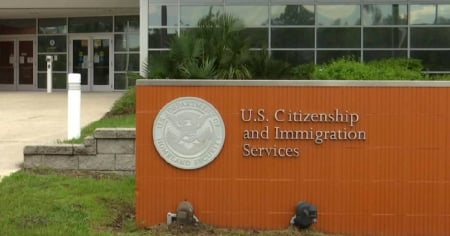The Cuban doctor Elisbet Cardero, 37 years old, was released this week after spending more than 20 days detained in an immigration transition center in Broward, Florida. Cardero, who entered the United States in 2022 and was in the asylum process with an I-220A form, was arrested on March 11 after attending an immigration appointment in Miami.
According to her lawyer, Ralip Hernández, the detention was not related to criminal offenses, but rather to an apparent administrative error: the doctor did not properly notify a change of address after moving to Texas. "We were able to demonstrate that my client poses no danger to the United States," Hernández stated, after securing her release on a $20,000 bond.
Cardero had arrived in the country through the border in 2022 and was granted an I-220A, a document that allowed her to continue her process while remaining free. However, when attending her immigration appointment, she was abruptly arrested. "In an instant, she went from being an asylum seeker in process to a detainee awaiting resolution," explained her cousin, Betsy Cardero, who added: "She is doing very poorly, too stressed... in limbo".
The case has raised concerns within the migrant community, highlighting how bureaucratic errors can jeopardize the freedom of individuals in legal status. "A person with no criminal record, with no legal issues, was detained simply for not updating their address as required through legal channels," explained the attorney, who noted that many immigrants are unaware of the obligation to update their address with the authorities whenever they move.
"The process is simple and can be done online, but not doing it can lead to serious problems," warned Hernández, who emphasized that immigrants with open cases before ICE must be especially cautious: "Any inconsistency in their file could result in unexpected detentions."
In recent weeks, various similar cases have been reported, especially among Cuban citizens under the same immigration status (I-220A). On March 10, at least five Cuban women were detained at the ICE office in Miramar during their scheduled appointments. Several of them, such as Beatriz Monteagudo and Denice Reyes, were transferred to centers in other states without clear information about their destination.
On March 25, Esteban García del Toro, an exiled Cuban journalist, was arrested during an appointment in Orlando, despite being in the process of obtaining residency through marriage to a U.S. citizen. Other recent cases include Ariel Rodríguez Gutiérrez, a victim of a migration fraud, and Eduardo Núñez, who was arrested in front of his house in Miami while taking out the trash.
The general context has become tense since on March 25, the Department of Homeland Security (DHS) announced the revocation of the humanitarian parole program for Cubans, Haitians, Nicaraguans, and Venezuelans. Starting April 24, active permits will no longer be valid, and those who have not adjusted their status could face expedited deportations.
Cases like that of the presenter Diony Osniel López Díaz in Miami reflect the distress of thousands of migrants who are now forced to leave the country or face legal proceedings. The couple of Cuban dissidents Lázaro Yuri Valle Roca and Eralidis Frómeta also received a departure notice, which they have described as "a death sentence" if they return to Cuba.
The situation has sparked intense debate on social media, among migrant communities, and in political sectors. Congresswoman María Elvira Salazar publicly urged immigration authorities to stop the detentions of individuals with I-220A and allow their asylum cases to be heard. "I am pleading for them to be granted Parole in Place," she stated.
Experts in immigration law insist that many of these detainees have no criminal records and meet the conditions imposed by ICE. However, the new guidelines adopted since Donald Trump's arrival in the presidency have intensified fears within the Cuban community in the U.S., which is now facing an increasing sense of uncertainty.
Meanwhile, Elisbet Cardero will continue her legal process while free, but her case is yet another reflection of a system that, in the context of recent regulatory changes, jeopardizes the lives of thousands of migrants.
Frequently Asked Questions about the Immigration Status of Cubans with the I-220A in the United States
What is the I-220A form and what does it mean for Cubans in the U.S.?
The I-220A form is a document that allows for the release of individuals from immigration custody under certain conditions. This document does not grant legal status or immigration rights in the United States, leaving the beneficiaries in a state of legal uncertainty. Cubans with I-220A must appear at immigration hearings and comply with local and federal laws.
Why are Cubans with I-220A being detained when attending appointments with ICE?
The detention of Cubans with I-220A is due to a tightening of immigration policies and bureaucratic errors, such as the failure to update addresses. These detentions reflect increased oversight by ICE, despite the fact that many of those detained have no criminal records and have fulfilled their legal obligations.
What measures are lawmakers taking to assist Cubans with I-220A?
The Cuban-American congresswoman María Elvira Salazar has advocated for the release of detainees with I-220A and is working on a bill to regularize their status. However, there is criticism regarding the lack of more decisive actions from Cuban-American congress members, who could pressure the Department of Homeland Security to clarify the status of these migrants.
Is there a risk of deportation for Cubans with I-220A?
While they have open asylum processes, Cubans with I-220A should not face immediate deportation. Attorney Mayron Gallardo has asserted that Cubans with I-220A and open asylum cases are protected by current legislation. However, uncertainty remains due to changes in oversight and immigration policies.
Filed under:
